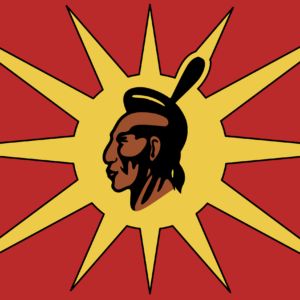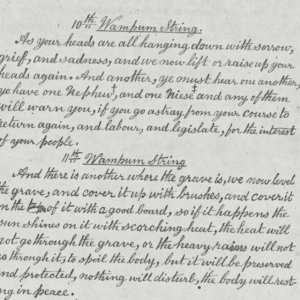My Dudah’s English (language) name was Frances Butler and she married Joseph Garlow back before there was hydro on Six Nations Reserve No. 40.
She once told me that our family is part Scotch and I suppose that is why she was a lighter-skinned Dudah. I sometimes wonder if my family is related through her to the Butler’s Rangers.
They were a British Loyalist regiment who fought in the Revolutionary War alongside Joseph Brant and many other Six Nations Hotiskennaketa (warriors). Despite her lighter skin tone she was Mohawk through and through.
I can remember being a small child and playing on her rug beside the wood stove while she chatted away on the phone speaking a “foreign” language that I didn’t understand.
Now I know that she was speaking Kanien’keha:ka (Mohawk) to her friends and I was told that she preferred speaking that way because it was a much more colourful way to communicate.
By the time I was a teenager she spoke less and less because her friends were becoming scarce; she was almost 80 years old. Before she passed away I had the chance to ask her why she didn’t teach the language to her children and her response was “Back in those days (in the 40’s) it was too hard to be Indian.”
What she meant was that the colonial government called Canada had imposed an Indian Act to create pressure to enfranchise the Ongwehon:we, to remove our customs, language and ceremonies and to assimilate us as citizens of their country.
The colonial government was hoping that we would tire of the segregation and apartheid style living of Indian-hood and eventually sign up to enjoy the capitalist franchise by taking an English name and renouncing any Indian title, and thereby effectively becoming Canadian.
For her and many other parents in those days, a future that didn’t involve Canadian education seemed very bleak indeed. None of these Garlows’ had been taken to residential school but we lost our connection to the language just as surely through voluntary election.
Fast forward to 2013 and it has become apparent that the resurgence of national identity through language is imminent and is paramount for our people. At the Two Row Times we plan to implement a column written entirely in Gayogoho:no (Cayuga) and also Kanien’keha:ka (Mohawk) without translations.
If you can’t read it then I hope it will inspire you to learn. I predict that in 20 years time we will have a circulation that is fully immersion without a drop of English.
This idea could be troubling for those old fashioned English-only readers like myself but consider yourself warned. With this foresight and vision we can start preparing for the future right now by picking up the language a little bit at a time.
Perhaps the Corporation of Canada should start developing a Canadian language because this land is not England and it will not be long before our nations come to consider English as the “foreign” tongue, not the original languages that have been spoken here for thousands and thousands of years.
For my friends and relatives of immigrant-descent this will be a time to implement the friendship and trust that is promised within the white rows of wampum between our two beautiful vessels: the ship and the canoe. We must learn how to speak these ancient words together!







I have been wanting to learn Gayogoho:no language where would I be able to?
aniweyo good congratulations on deciding to start column in cayuga and kanienkeha. my hope is that you do incllude translations as this will greatly assist people who want to recover or learn our languages do so more easily. also, people will not get split into the i know and i dont know groups. language is a living thing and it takes 2 people to speak it….and we all begin as children. ehtho niiotonhonkne onkwa nikon ra. now let our minds be one
It is about time our future generations learned [ HOW ] to speak and write our Native Language[s],without
any slang words of English in our Native Language.
It has been over sixty years since myself has been able to speak our language of Mohawak and I do admit
that I have totally forgot how to speak the language. But with some help from a well qualified teacher who is able to speak our language and write the language,I am willing to relearn our language of the
Mohawk Nation to include the writing of The Nations Language.
Since my time of my youth I have been in Viet Nam and then went to The University of Hawaii to future my education and then I had employment with NASA and now I am retired. During that time in my life I
have not been able to speak [ any ] Mohawk at all,for the person who taught me was my grandmother and she has been dead for near fifty years now.
Respectfullly yours;
Dr. Maurice J Hayes
[ aka ] Mojo Rising
Now that’s what I’m talkin’ bout!!
My bro and I greeted each other in Seneca, and someone said “What that foreign language you’re speaking?” in a condescending tone. I said “actually, you’re speaking the foreign language, we were using a Native language.”